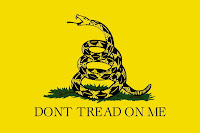I've outlined the teaching of the Catechism on “just war”; I've presented the pacifist case, represented by Dorothy Day and effectively endorsed by CCC 2304–2306. I'd like to return to a homily by St. John Chrysostom that I quoted on Thanksgiving Day, while throwing a bouquet to a man who combined aggression and pacifism in a historic way, St. Bernard of Clairvaux (pictured here).
 The homily, on Matthew, makes an odd proposal: Be a sheep, not a wolf, it says; and at the same time, be both a snake and a dove.
The homily, on Matthew, makes an odd proposal: Be a sheep, not a wolf, it says; and at the same time, be both a snake and a dove.Sheep over wolf? I get that. Blessed are the poor, the meek, the mournful, the peacemakers, and those who hunger and thirst after righteousness. According to St. John, the shepherd (Jesus) tells us,
Do not be upset that, as I send you out among the wolves, I bid you be as sheep and doves. I could have managed things quite differently and sent you, not to suffer evil nor to yield like sheep to the wolves, but to be fiercer than lions. But the way I have chosen is right. It will bring you greater praise and at the same time manifest my power.
If Jesus had wanted us to be wolves, He would have told us so. Wolves show off their own power (as our government and most other governments often do); but He wants us to “manifest” His power. Yep, he's asking us to be martyrs, and martyrdom is not in the contemporary code of conduct of our culture. But it is what He asks for.
Then He asks for something else. He wants us to “contribute something,” according to the early Church Father, “lest everything seem to be the work of grace . . . ”
Therefore he adds: You must be clever as snakes and innocent as doves. . . . What cleverness is the Lord requiring here? The cleverness of a snake. A snake will surrender everything and will put up no great resistance even if its body is being cut in pieces, provided it can save its head. So you, the Lord is saying, must surrender everything but your faith: money, body, even life itself.
 In other words, He is asking us not merely to lie down in front of the sword and lay everything to grace. We have to make an effort. It is an effort of surrender (an oxymoron? no), also an effort of holding on to our faith when everything else is gone. And we have to do all this while remaining innocent as doves. St. John puts a spin on snakes, as passive: They "will surrender everything and will put up no great resistance . . . " I'm not qualified to contradict a saint, but I wonder if there isn't something more here, as well.
In other words, He is asking us not merely to lie down in front of the sword and lay everything to grace. We have to make an effort. It is an effort of surrender (an oxymoron? no), also an effort of holding on to our faith when everything else is gone. And we have to do all this while remaining innocent as doves. St. John puts a spin on snakes, as passive: They "will surrender everything and will put up no great resistance . . . " I'm not qualified to contradict a saint, but I wonder if there isn't something more here, as well.A snake was the Original bad animal, the serpent in the garden. A snake can be deadly. But a snake is also clever, cagey, sly. A snake waits and calculates the moment for striking. It may "surrender everything" but it is also capable of delivering a lethal blow suddenly and with chilling efficiency. The Navy motto "Don't Tread on Me," featuring a coiled snake, originated in the American Revolution as a symbol of the Colonies' willingness to resist aggression. The coiled snake takes a defensive posture, but will go on the offensive if provoked, and woe to the aggressor.
In this rich symbol, as in the model of St. Bernard of Clairvaux, I think I see another example of the Church taking a position not of either/or but of both/and. Under St. Bernard the Cistercians (later "Trappists"), a reformed order of Benedictines and ideally as peaceful as they come, emerged as a growing, vibrant force in the High Middle Ages. Yet, Bernard also preached the Second Crusade, inciting Christian knights to take back the Holy Lands. (For my knowledge of St. Bernard I am indebted to Frank, as well as Wikipedia. My knowledge runs deep!)
While I was on retreat a few weeks back, Father Matthew, our retreat director, cited St. Bernard as a conundrum: How could he have been a monk, a general, and a saint—all in one? I guess I prefigured an answer to that question with the title of my post about the retreat: Because Monks Are Just Soldiers in Awkward Clothes. Remember this about St. Bernard next time you think about just war and pacifism: He was a monk, he was a general (though he stayed home in his bunker), and he was a saint. Is there a lesson in that?
